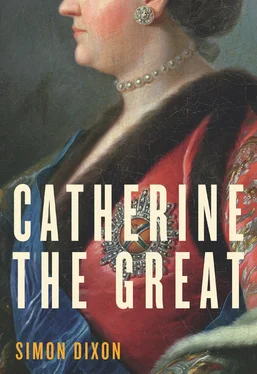It was as an officer in Prussian service that Sophie’s father, the impoverished scion of a cadet branch of the princely House of Anhalt, had been obliged to make his career. By 1729, having served in the Low Countries during the War of the Spanish Succession, he had reached the rank of major general and was stationed at Stettin in command of the 8th infantry regiment. Following his promotion to command the garrison, Christian August and his family moved from the house on the Domstrasse into the nearby ducal castle, which had been denuded of its more exuberant decoration in keeping with the king’s militarist ideals. 10Having had himself crowned ‘king in Prussia’ in 1701 at a ceremony in Königsberg that cost roughly twice the annual revenues of the Hohenzollern administration, Frederick William I’s father (Frederick, Elector of Brandenburg, 1688–1713) had gone on to establish an elaborate Baroque Court. 11Almost every feature of it except the hunt was dismantled by his son. Whereas the Court of Berlin had spent 17,000 thalers on confectionery alone in 1707, its total annual expenditure was limited under Frederick William I to 52,000 thalers. 12Surrounded by rubble from the town’s newly strengthened fortifications, Christian August’s circumstances in Stettin were even more spartan. Sophie saw little of him, though she always respected his integrity, his piety, and his knowledge of classical Rome. That was what she meant when, shortly before her fiftieth birthday, she told the Prince de Ligne that she had been ‘brought up in the army with respect for republics’. 13
In the gloomy, granite castle, the little girl and her nurses occupied three vaulted rooms on the upper floor of the wing adjoining the chapel. Every morning and evening, Sophie knelt to say her prayers in a bedroom next to the bell tower, where she remembered being disturbed by phantom noises from the organ, allegedly made by mischievous servants. As she told her principal correspondent in adult life, Baron Melchior Grimm, on discovering that he was contemplating a visit to Stettin in 1776, ‘I gambolled across the whole of this wing three or four times a day to visit my mother, who lived on the other side.’ 14Johanna Elisabeth, however, had little time for her first-born, paying more attention to her lame son, Wilhelm Christian Friedrich, who came into the world eighteen months after Sophie and was taken from it by scarlet fever at the age of thirteen. Of the three further children, only Friedrich August, born in 1734, survived to adult life: Auguste Christine Charlotte lived but twelve days in 1736; the third daughter, Elisabeth, born in 1743, not long after Wilhelm’s death, was left behind when her mother took Sophie to Russia, causing both of them grief when she died in 1745. 15
Since there could be no question of formal schooling for the female offspring of a minor German prince, Sophie’s education was entrusted from the age of four to her Huguenot governess, Elisabeth (Babet) Cardel (b. 1712), the younger sister of her nurse, Magdalena. Babet taught her to spell and to read, and introduced her to a pleasure that was to remain with her for the rest of her life: listening to friends read aloud. A dancing master was employed to teach the basic courtly arts, though this was later dismissed as ‘a waste of money, because really I only learned to dance much later—this is how a precocious education usually leads nowhere’. The rudiments of a more formal curriculum in French, German and the Scriptures were taught by the Pietist pastor Friedrich Wagner, a chaplain in her father’s regiment. 16This was a far more prestigious position than it sounds. The Pietist pastors chosen to become army preachers ( Feldprediger ) in Frederick William I’s Prussia were a zealous elite appointed directly by the king, who relied on them to transform illiterate peasant recruits into God-fearing, disciplined soldiers. Their most prominent convert was Prince Leopold of Anhalt-Dessau, Christian August’s cousin and the king’s leading general. 17Since the very notion of childhood was barely developed among princely households at the time—all Sophie’s dolls and toys were removed at the age of seven on the grounds that she was ‘a big girl, for whom they were no longer suitable’ 18—it probably never occurred to her father that an army preacher’s methods might not suit a girl of tender age. She certainly failed to respond to them. ‘I bear no grudge against Monsieur Wagner,’ Catherine told Grimm in 1778, ‘but I am intimately persuaded that he was a blockhead, and that Mademoiselle Cardel was an intelligent girl.’ 19
She developed the contrast in a memoir begun on her forty-second birthday in 1771. Here Wagner is portrayed as a dull pedant, keen to resort to the rod in the face of her impudent questions (she claimed to have challenged the Creation story and asked him about circumcision). Refused permission to beat his young pupil, he took his revenge by frightening her with stories of the Last Judgement and imposing an unforgiving regime of rote learning which helped to harden her mind against organised religion. Since the Word was central to Pietism—an emotional brand of religiosity which stressed the intensely personal bonds between individual believers and their God—its pastors regarded the Scriptures as the main source of religious authority and the ultimate guide to everyday behaviour. Wagner was no exception. ‘I do not believe that it could be humanly possible to remember all that I had to learn by heart,’ Catherine later complained, ‘nor that there was any point in doing so. I have kept to this day a German Bible, in which all the verses I learned from memory are marked in red ink.’ 20By contrast, Babet Cardel appears in the empress’s memoirs as ‘a model of virtue and wisdom’. ‘She possessed a naturally elevated soul, a cultivated mind, and an excellent heart: she was patient, gentle, gay, just, steadfast—in truth, everything one could wish to find in people who look after children.’ Babet’s gentle inquisitiveness generated a sympathetic response: ‘I yielded to her alone; she smiled to herself and reasoned with me so gently that I could not resist her. All my life, indeed, I have preserved this inclination to yield only to reason and gentleness: I have always resisted pressure of any kind.’ 21
Artless as they may seem, such reflections form part of a carefully constructed persona which Catherine had already begun to fashion in her first brief memoir, written six years before she seized the Russian throne. Taking a detached view of her own character and conduct, she anticipated many of the features of the classic Enlightenment autobiographies by presenting herself as a rational, independent spirit—‘I was excessively lively and rather wayward in my childhood’—struggling to overcome the superstitious adults who supervised her upbringing. 22While Sophie’s parents consulted leading German doctors in their attempts to cure Wilhelm’s lameness, and sent him to take the waters at Aix-la-Chapelle, Teplitz and Karlsbad, a specialist in ‘dislocation’ proved harder to find when it seemed that Sophie might grow up with a curvature of the spine. In the end, they resorted to the public hangman, who recommended that a local girl be summoned every morning to rub Sophie’s back with her saliva and designed a primitive corset to straighten her limbs. She wore it until she was ten, growing increasingly self-conscious about her appearance. ‘I don’t know whether it is true that I was ugly as a child,’ the mature empress mused, ‘but I certainly know that people often told me so.’ 23
To compensate for lack of beauty, Sophie tried to be amusing instead. If we believe her memoirs, she also learned to be secretive. Since a degree of dissimulation was regarded as an important weapon in any successful ruler’s armoury—‘Behave cleverly in public,’ Catherine told Potëmkin at the height of their affair in 1774, ‘and that way no one will know what we are thinking. I so enjoy being crafty!’ 24—we should not be surprised at her claim to have mastered the skill so early. But for all the careful construction in the empress’s memoirs, there seems little reason to doubt that she was accustomed to keeping things to herself from an early age. Most children do, as the adult Catherine came to realise. ‘One never knows what children are thinking,’ she warned Grimm in 1776, a year before the birth of her first grandson, ‘and children are difficult to get to know, especially when a severe education has turned them into docile listeners and they have learned from experience not to tell things to their teachers. From that, if you please, you will derive the fine maxim that one should not scold children, but put them at their ease, so that they do not hide their blunders from you.’ 25
Читать дальше












